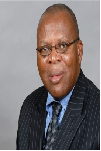
David Olowokere
Texas Southern University
USA
Title: Case Study of Satellite-Based AIS system for continuous tracking at sea of global movement of Nigerian liquefied natural gas.
Biography
Biography: David Olowokere
Abstract
All international ships of more than 300 tons and all passenger vessels, irrespective of size, are mandated by the International Convention for the Safety of Life at Sea (SOLA) to carry a transponder that broadcasts their position, course and speed. This tracking system, called the automatic identification system (AIS), sends information to other nearby vessels so it can be displayed and utilized in conjunction with radar. Satellite AIS data are transmitted through very high frequency (VHF) radio waves, so its horizontal range has generally been limited to approximately 50 nautical miles or less. Maritime authorities, recognizing the benefits of tracking a ship's identification, location, heading, speed and cargo, have installed AIS receivers on shore that capture relevant real-time ship information, allowing tracking of ships. The use of AIS information in congested shipping areas has indeed become standard practice for many nations. This paper is a case study of the tracking of movements of selected shipments of LNG from the Bonny terminal in Nigeria to selected global destinations. Real-time movement along certain paths which are considered off-course will be demonstrated. Explanations of motives and intentions of the displayed errant movement will be put forth, and conclusions postulated.
